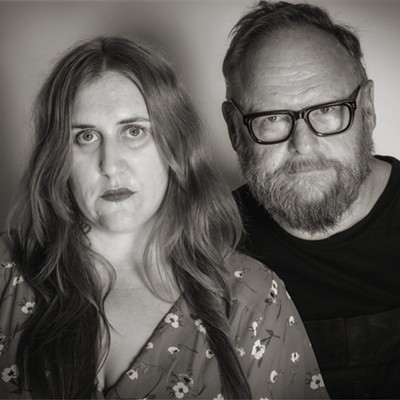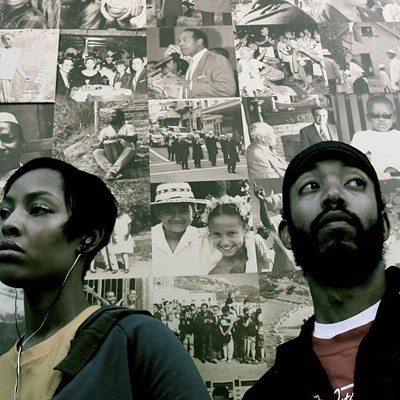Lilly plays the role of solo musician/bandleader well: Her keyboard-based songs sparkle with cool synthesizer sounds, smart lyrics and a thoughtful musicality. Take, for example, "It's Because of People Like You," inspired by a mean note left on Lilly's car, and on which bubbly synthesizers contrast with the forceful chorus: "If one more person tries to show me their faulty logic, God help me, I will lend them brains to borrow."
Obi Best invokes the usual suspects--'60s and '80s pop, indie-rock preciousness and musical theater--but make no mistake: Lilly is a talented songwriter and producer who can craft a song with focus, precision and an incredible attention to detail. So it makes sense that Lilly compares her songwriting to interior design or dressing up.
"When I'm producing (a song), I choose sounds that really help to decorate and dress up the song in the appropriate attire that I imagine it in," she explained. "I feel like sometimes, when you're listening to a song, it occupies a certain space; it feels like a room. Some bands have written songs where it feels like everything that's there in the song is an object or something that is helping to create this world that you're living in for three minutes."
For example, said Lilly, when she and co-producer Oscar Schedin were working on "Swedish Boy," "it made sense to use kind of a primitive, monotonous sound. And then I sort of chanced upon this sort of fun, total faux-ethnic sound. When you hit the right sound, it's like, 'Oh yeah, that's what I'm looking for.'"
Each of the songs on Capades, Obi Best's first album and the first to be released on Social Science Recordings, is a playful world with just the right sounds blended in. Some are what one would expect--traditional Japanese sounds abound in "Origami," saws and wind in "Within These Forest Walls"--but some are surprising, like the wailing electric guitar in the piano-pop "Nothing Can Come Between Us."
"Usually, I write stuff on sort of a boring-sounding piano, and then I dress it up later, fancy it up, for the recording," said Lilly. The songs remain mostly key-oriented, though when fancying up a song, Lilly makes the switch to synthesizers. "I use synthesizers, because it's just really hard to mic pianos," she laughed.
Ironically, it's the '80s-esque synthesizer sounds that really give Obi Best's songs their identity. As Lilly explained, so many bands these days are using those sounds in music that is intended to be original and contemporary, precisely because there's something comforting and childlike about them.
Overall, Capades (released digitally in August; physical release is set for Feb. 24) has the feel of a modern, colorful playroom. The furniture is comfortable; the light is bright and natural; and everywhere you look, there's something fun to do. And that's exactly what Lilly was going for, even down to the name Obi Best.
"I feel like there's almost an anti-punk sentiment to it, because it's kind of like this annoyingly cheerful name," she said. "'Obi' is the name of the sash that goes on a kimono, and I thought it would be a pun: Obi Best; oh, be your best. It stems from the sentiment we were trying to produce: a childlike, go-get-'em attitude."
This kind of attitude toward music is a far cry from your standard L.A. rock band, with the area's jaded Hollywood angst and overwrought attempts at hipness. Instead, said Lilly, Obi Best is just one of many bands from the L.A. area who have nothing to do with the L.A. of the major-label bands.
"That L.A. hasn't existed for me for so long. ... We all kind of ignore it," said Lilly. "I hope when people think of L.A. bands and L.A. music, they think of actual creative bands with identities."
With Lilly's work in Obi Best, as well as The Bird and the Bee, that kind of L.A. is becoming more real for the rest of us.











